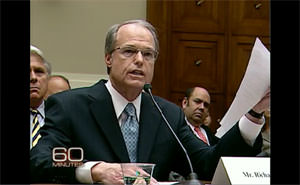Truthdiggers of the Week: Two Mortgage Meltdown Whistle-Blowers
It's all too rare that a mainstream news network goes after just the sort of financial heavy hitters that tend to have ties to their own corporate sponsors, but thankfully, that's what CBS News' "60 Minutes" did last weekend with the help of two principled mortgage specialists.
It’s all too rare that a mainstream news network goes after just the sort of financial heavy hitters that tend to have ties to their own corporate sponsors, but thankfully, that’s what CBS News’ “60 Minutes” did last weekend with the help of two principled mortgage specialists. In fact, the news magazine and anchor Steve Kroft wouldn’t have had much of a story without former Countrywide Executive Vice President Eileen Foster and former Citigroup Senior Vice President Richard M. Bowen III. Note that they share the “former” designation, which is no coincidence.
Both whistle-blowers made headlines before agreeing to sit for their “60 Minutes” interviews, but their stories have a certain open-ended quality to them in that, as Kroft points out in the news magazine’s report that aired Dec. 4, the Justice Department has yet to bring charges against any major Wall Street players who shared responsibility for the cataclysmic financial implosion that first registered in 2008 and still resonates today. This glaring failure on the part of the DOJ to carry out its duties becomes even more infuriating considering top-tier executives from implicated companies such as Citigroup and Countrywide blatantly denied the parts they played in the meltdown and signed what should have been damning documents to back up their claims.
File that information under business as usual for the ever cozier relationship between Wall Street and the White House. But luckily, people such as Foster and Bowen were willing to do their jobs — and themselves, and consumers — justice by first reporting signs of trouble to their higher-ups at Countrywide and Citigroup, respectively, and then refusing to let their former employers buy their silence, even if their ethics cost them their jobs.
It’s also clear, from both of their accounts on “60 Minutes,” that they were aware of the risks that taking action might involve, once they got over the shock of discovering the widespread fraud happening under their noses at both firms. In fact, Bowen found that 60 percent of Citigroup’s mortgages for the year 2006 were defective. And the circumstances under which their employment status changed were also sketchy at best, if not criminal. As Foster put it: “It’s a crime to retaliate against someone for making reports of mail fraud, bank fraud, wire fraud, mortgage fraud — things that would harm stockholders and investors — and that’s what I did, and that’s why I was terminated.”
However, she got some satisfaction (other than the nearly $1 million case she eventually won in court against her former employer, now absorbed into Bank of America) by refusing to sign a 14-page document guaranteeing her silence. “I wanted them to have some sleepless nights thinking about what they would say to a federal investigator and worry about being exposed and being held accountable for committing a crime,” she told Kroft.
For his part, Bowen made waves by taking his story to the top, first at Citigroup (he even sent an email to Robert Rubin in 2007) and then on Capitol Hill on April 7, 2010, before the Financial Crisis Inquiry Commission. Bowen described his motivation in simple terms: “Somebody needed to pay attention. Somebody needed to take action.” Good thing that he, as well as Foster, did — even if the Justice Department couldn’t follow their examples. –KA
“60 Minutes” with Steve Kroft:
Part 1:
Part 2:
Your support matters…Independent journalism is under threat and overshadowed by heavily funded mainstream media.
You can help level the playing field. Become a member.
Your tax-deductible contribution keeps us digging beneath the headlines to give you thought-provoking, investigative reporting and analysis that unearths what's really happening- without compromise.
Give today to support our courageous, independent journalists.



You need to be a supporter to comment.
There are currently no responses to this article.
Be the first to respond.